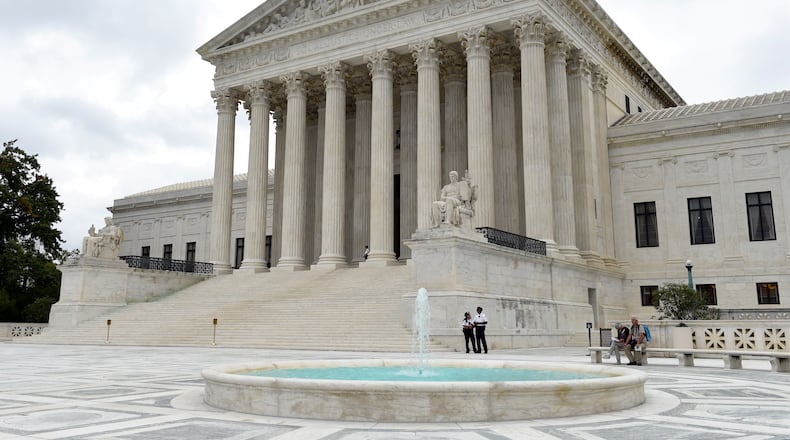Justice Anthony Kennedy wrote for a five-justice majority as the U.S. Supreme Court brought same-sex marriage to every corner of the country.
The 103 pages here include Kennedy's majority opinion and dissents from Chief Justice John Roberts, Justice Antonin Scalia, Justice Clarence Thomas and Justice Samuel Alito.
Some key snippets from Kennedy:
"Marriage responds to the universal fear that a lonely person might call out only to find no one there. It offers the hope of companionship and understanding and assurance that while both still live there will be someone to care for the other. ...
"As all parties agree, many same-sex couples provide loving and nurturing homes to their children, whether biological or adopted. And hundreds of thousands of children are presently being raised by such couples. See Brief for Gary J. Gates as Amicus Curiae 4. Most States have allowed gays and lesbians to adopt, either as individuals or as couples, and many adopted and foster children have same-sex parents, see id., at 5. This provides powerful confirmation from the law itself that gays and lesbians can create loving, supportive families.
"Excluding same-sex couples from marriage thus conflicts with a central premise of the right to marry. Without the recognition, stability, and predictability marriage offers, their children suffer the stigma of knowing their families are somehow lesser. They also suffer the significant material costs of being raised by unmarried parents, relegated through no fault of their own to a more difficult and uncertain family life. The marriage laws at issue here thus harm and humiliate the children of same-sex couples. ...
"Were the Court to uphold the challenged laws as constitutional, it would teach the Nation that these laws are in accord with our society's most basic compact. Were the Court to stay its hand to allow slower, case-by-case determination of the required availability of specific public benefits to same-sex couples, it still would deny gays and lesbians many rights and responsibilities intertwined with marriage."
From Roberts:
"If you are among the many Americans—of whatever sexual orientation—who favor expanding same-sex marriage, by all means celebrate today's decision. Celebrate the achievement of a desired goal. Celebrate the opportunity for a new expression of commitment to a partner. Celebrate the availability of new benefits. But do not celebrate the Constitution. It had nothing to do with it."
From Scalia:
"Of course the [majority] opinion's showy profundities are often profoundly incoherent. 'The nature of marriage is that, through its enduring bond, two persons together can find other freedoms, such as expression, intimacy, and spirituality.'23 (Really? Who ever thought that intimacy and spirituality [whatever that means] were freedoms? And if intimacy is, one would think Freedom of Intimacy is abridged rather than expanded by marriage. Ask the nearest hippie. Expression, sure enough, is a freedom, but anyone in a long-lasting marriage will attest that that happy state constricts, rather than expands, what one can prudently say.)"
From Thomas:
"In our society, marriage is not simply a governmental institution; it is a religious institution as well. Id., at 7. Today's decision might change the former, but it cannot change the latter. It appears all but inevitable that the two will come into conflict, particularly as individuals and churches are confronted with demands to participate in and endorse civil marriages between same-sex couples."
From Alito:
The decision "will be used to vilify Americans who are unwilling to assent to the new orthodoxy. In the course of its opinion, the majority compares traditional marriage laws to laws that denied equal treatment for African-Americans and women. E.g., ante, at 11–13. The implications of this analogy will be exploited by those who are determined to stamp out every vestige of dissent."
About the Author


